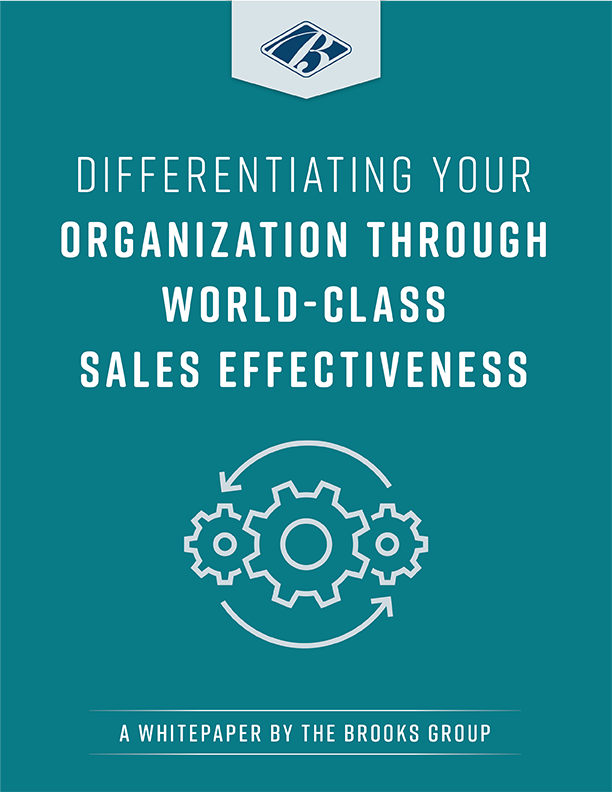Why Value-Based Selling Training Is Critical
Buyers are more in control of the sale today than ever before. With unlimited access to information and options, they’re more critical when selecting a provider, and they must be solidly convinced of value before they commit.
Research from SiriusDecisions shows that the biggest problem facing sales teams isn’t education, skills, technology, or budgets, but an inability on the part of salespeople to communicate value to prospects. Seventy-one percent of sales managers think the value gap is the most important problem their salesforces face, while just 10 percent of buyers said sales reps were value-focused in their interactions.
Having a dedicated sales process is the first step in enabling your sales team to build value in the eyes of your prospects. Here are 3 reasons why.
1. Salespeople Can Align the Selling Process to the Buying Process
Buyers follow their own process during interactions with a salesperson, but this fact is overlooked by sellers who are focused only on personal interests, rather than solving the issues of the buyer. Smart salespeople who focus on the needs and wants of the customer follow a consistent selling process and align it to the process buyers are moving through themselves.
The buyer goes through the same process that a seller would go through, simply through a different perspective. The problem is that if your sellers don’t have a defined sales process in place, they won’t understand how buyers move through those stages, and they will miss opportunities to ask the right questions at precisely the right time.
Key takeaway: Your people must have a sales process that’s built to be flexible enough to allow the rep to quickly meet the buyer where he or she is on the buyer’s journey. A rigid sales process focused only on moving the buyer to the close may hold them back in today’s marketplace.
2. Salespeople Can Work with the Buyer to Diagnose the Challenge
When a prospect has already self-diagnosed their challenge and decided on what they think the solution should be, it’s harder for a salesperson to build the value of their offerings. Having a defined sales process in place allows a salesperson to know exactly where the buyer is in the process, and whether they need to take action to have them reverse and rethink the diagnosis by raising the right thought-provoking questions.
Without the framework of a flexible and buyer-focused sales process, salespeople will be responding to what they think the diagnosis is, rather than collaborating with the prospect. This collaboration minimizes resistance and allows the salesperson to maintain clear direction of the process, while positioning them as a strategic advisor.
Key takeaway: With the volume of information available to buyers today, they often draw their own conclusions about what they need before they even engage with the rep. A rep must be able to diplomatically and intelligently overcome these preconceived notions at the appropriate time, and a value-based sales process can allow them to do that.
Hear from one of our clients on her organization’s experience with IMPACT Selling®
3. Process Breeds Discipline
Salespeople that adhere to a well-defined sales process are forced to be intentional when progressing through each stage. That focus is intensified when sales leaders assign key activities and metrics into each stage of the process; reps know that an opportunity cannot advance to the next stage until each activity is completed, and they know that their sales leader will be expecting an update on those milestones during coaching sessions.
Following a sales process requires more planning and strategizing, and it forces salespeople to move away from transactional interactions and towards value-added business conversations. That increased customer-focus helps gain the trust of potential buyers and shows them the value the salesperson can provide.
Key takeaway: Having a sales process that installs discipline around key activities proven to get results is crucial. Your sales reps should have a defined sales process to follow. Choosing a straightforward, easy to learn process like IMPACT Selling makes it more likely that your reps will apply what they’ve learned on a consistent basis–maximizing the ROI of your sales training dollars.
Conclusion
To effectively execute value-based selling training, your sales team must shift their focus and ask themselves how the customer will be better as a result of doing business with them. Following a well-defined sales process allows that shift in focus to happen, and enables sellers to build value in the eyes of their prospects by presenting them with the most appropriate solutions.
The IMPACT Selling system is a straightforward sales process that’s been taught to over one million sales professionals around the world. Consultative and buyer-focused, the system gives sellers a roadmap to follow when enaging with customers and prospects from pre-call planning, to securing the sale, to following up and asking for referral business.
If you’re ready for your sales reps to take a buyer-focused approach that leads to more closed business, referrals, and selling deeper into the organization, we are here to help! Please request a private consultation below.
Differentiating Your Organization Through World-Class Sales Effectiveness
Is it possible to use your sales team to set your organization apart from the competition? The answer is yes—as long as you’re taking the steps to empower your salespeople and set them up for success. This whitepaper will show you how.





